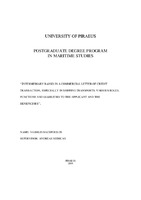Intermediary banks in a commercial letter of credit transaction, especially in shipping transports : various roles, functions and liabilities to the applicant and the beneficiary

Master Thesis
Συγγραφέας
Μπακόπουλος, Βασίλης
Ημερομηνία
2006-11-15Προβολή/
Θεματική επικεφαλίδα
Letters of credit ; Commercial lawΠερίληψη
Under a documentary credit transaction, the issuing bank undertakes an obligation directly to the beneficiary of the credit to pay against tender of documents which conform to the terms of the credit (doctrine of strict compliance). However, unless the credit states that the beneficiary may seek payment from the issuing bank alone, the credit must authorize payment by at least one further bank, termed the «nominated bank». Τhe Uniform Customs provide that a credit may be advised to a beneficiary through another bank, termed the «advising bank», without engagement on the part of the advising bank, but that bank shall take reasonable care to check the apparent authenticity of the credit which it advises . If the bank confirms it undertakes all the obligations embodied in the credit . In advising the credit, the advising bank acts as the issuing bank’s agent. The liability of a confirming bank to the seller – beneficiary must depend on the terms in which it gives its confirmation, but in general it adopts the obligation of the issuing as contained in the credit . In short, the intermediary as a confirming bank is obliged to honors the credit I the documents appear on their face to be in order, whether or not there has been a breach of the contact of sale. By issuing or confirming a letter of credit, banks assume an obligation to pay, irrespective of any dispute which there may between the parties on the question of whether the goods are up to contract or not. The only exception to this rule is the concept of fraud under which banks are entitled to withhold payment.


